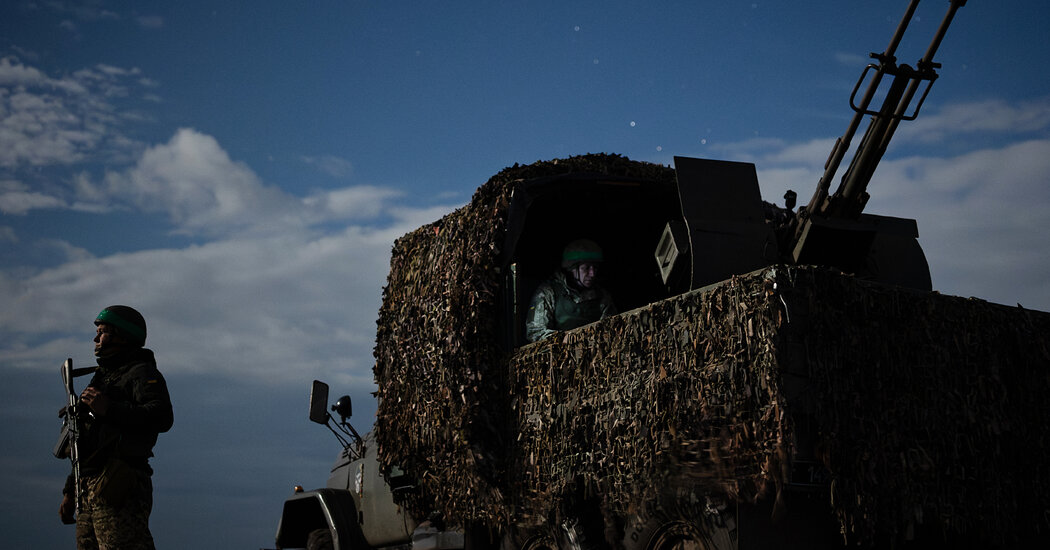The war in Ukraine is heading into its fourth winter. Western efforts to force Russia to the negotiating table have so far failed. But as Ukraine and its allies target Russia’s oil industry with drones and new sanctions, my colleague Constant Méheut writes about why this time might be different.
A shift to the energy front
 ” class=”css-dc6zx6 ey68jwv2″>
” class=”css-dc6zx6 ey68jwv2″>
Far from the largely deadlocked front lines, Russia and Ukraine are waging a fierce parallel war, betting on attacks against each other’s energy assets to break the stalemate.
This conflict became more prominent last week as the U.S. and Europe announced sweeping new sanctions on Russia’s oil industry, the lifeblood of the Kremlin’s war machine. Ukraine is also using what it calls “long-range sanctions” — drone strikes that have damaged dozens of the refineries where Russia turns crude oil into fuel.
For Russia, the target is once again Ukraine’s electricity and gas infrastructure, which it has attacked in a devastating campaign to cripple the economy and undermine morale as winter approaches.
Whether either side will yield anytime soon is uncertain. But analysts say each views its energy attacks as a strategic lever in a conflict that has ground on for nearly four years.
Heating up in winter
Russia’s forces are gaining territory, though very slowly and at great cost, and they are expected to keep pushing on the battlefield. But as winter slows the pace of ground fighting, with sparse vegetation reducing cover for troops and brutal cold straining their movement and equipment, the energy battle is likely to remain the most active area of conflict in the coming months.
Previous sanctions were aimed at depriving Moscow of its economic lifeblood — an energy industry that generates hundreds of millions of dollars a day. The Group of 7 nations put a cap on the price of Russian oil in 2022. Russia weathered that move by selling to countries such as China and India.
But President Trump’s latest sanctions on the Russian oil companies Lukoil and Rosneft go beyond previous measures. By blacklisting the two companies, Trump is now threatening to punish any company doing business with them around the world. The hope is that this will prompt key buyers such as India to curtail their imports.
Deprived of these funds, it could become more difficult for Russia to replace lost battlefield equipment and pay large sums to its army recruits.
Signaling Russia’s mounting economic strain, the country’s military spending is projected to go down next year, for the first time since the war began.
President Vladimir Putin of Russia has acknowledged that the sanctions will hurt the economy, but has insisted that they will not sway the Kremlin’s calculus in the war. Trump has suggested that Putin might feel differently in six months, once the sanctions start to bite.
In addition to the economic warfare, Ukraine’s long-range strikes on refineries had by last month destroyed or damaged about 20 percent of Russia’s refining capacity, according to one analyst. That has caused severe gasoline shortages in several regions, as Ukraine tries to bring the pain of war to ordinary Russians.
Undermining morale
As Ukraine and its allies pressure Russia on the energy front, Moscow has stepped up its military strikes against Ukrainian energy infrastructure. The goal, experts say, is to leave many people in the cold and the dark, undermining morale and disrupting economic activity.
This month, Ukraine started instituting emergency blackouts across the country to cope with electricity shortages caused by attacks on power plants and substations.
Russian attacks on Ukraine’s electricity infrastructure are not new, especially at the onset of winter, when power demand peaks. Over time, Ukrainians have adapted, relying on small generators and batteries to get by.
This year, however, Russia has expanded its campaign to strike Ukraine’s gas infrastructure, which fuels much of the country’s heating systems. Recent attacks on gas facilities have knocked out roughly 60 percent of Ukraine’s gas production capacity as well as a number of stations needed to pump gas through pipelines, according to a European official.
Several cities have delayed turning on centralized heating in residential buildings to cope with gas shortages. Fears are mounting that many households may go without sufficient heat this winter, in a country where subzero temperatures can linger for weeks.
We’ve seen something like this before. Russia has lots of practice enduring sanctions; Ukraine knows how to cope with cold winters under challenging conditions. But with the peace talks and the front lines frozen, both sides have decided that the energy war is their best hope to gain an advantage.
Interested in providing feedback on this newsletter? Take our short survey here.
MORE TOP NEWS
China and the U.S. agreed on a framework trade deal
Chinese and American trade negotiators said yesterday that they had agreed to a framework of a deal on tariffs and other issues ahead of a meeting this week between Trump and China’s leader, Xi Jinping.
Treasury Secretary Scott Bessent said that he expected China to delay export controls on rare earth minerals for a year. Trump had threatened to impose 100 percent tariffs on Chinese goods in response to Beijing’s restrictions on rare earths, which are vital for making an array of products, including computer chips. Bessent also said that the U.S. and China had reached “a final deal on TikTok” that the leaders would “consummate” at their meeting on Thursday in South Korea.
The breakthrough in talks with China came after Trump said he would punish Canada with an additional 10 percent tariff on its goods. The move comes amid a feud over a TV ad that used audio of Ronald Reagan denouncing tariffs.
The French police made arrests in the Louvre heist
A week after the spectacular robbery that stunned France, the police announced yesterday that they had made arrests in the case, without saying how many. One man was taken into custody at a Paris airport as he was trying to leave the country.
It was not immediately clear whether the police had recovered any of the eight jewelry pieces stolen from the Louvre, which were worth more than 88 million euros.
OTHER NEWS
-
Cambodia and Thailand signed a deal aimed at resolving their border dispute during a ceremony attended by Trump, who sought to burnish his image as a peacemaker.
-
Voters in Argentina went to the polls in midterm elections that will gauge support for President Javier Milei’s cost-cutting experiment.
-
Kamala Harris suggested in an interview that she was considering running for president again.
-
Egypt sent a team of experts into Gaza to help locate the bodies of deceased hostages.
-
A paramilitary group in Sudan said it had seized an army headquarters in El Fasher, clearing the way for it to control western Darfur.
-
Hurricane Melissa gained strength as it barreled toward Jamaica.
SPORTS
Baseball: Here’s what to watch for during Game 3 of the World Series today between the Los Angeles Dodgers and the Toronto Blue Jays.
Football: Real Madrid beat Barcelona 2-1 in the first Clasico of the 2025-26 season.
Formula 1: Get all the latest action and news from a crucial Mexico Grand Prix.
QUOTE OF THE DAY
“Wake up and live! Act as if it is impossible to fail. And that’s what I did.”
— In The Interview, Anthony Hopkins shares how he quiets the voice in his head that tells him he can’t do things.
MORNING READ
When Saulo Jennings heard he would be cooking for Prince William and his guests at an environmental awards event next month, the Brazilian chef knew he wanted to showcase the star of the Amazon region’s cuisine: a huge, fleshy river fish called pirarucu.
But it turned out that the menu had to be vegan and Jennings was told he could not use any of the cherished river fish species central to his dishes. “It’s like asking Iron Maiden to play jazz,” the chef said. Negotiations broke down. And now Jennings is out. Read more.
AROUND THE WORLD
What they’re rediscovering in … Japan
Kabuki is having a renaissance in Japan thanks to “Kokuho,” a blockbuster, nearly three-hour-long movie that celebrates the ancient art form.
“Kokuho,” which means “national treasure,” is the most popular live-action movie in Japan in decades, earning more than $100 million since its June premiere. Directed by Lee Sang-il, it tells the story of Kikuo, the son of a mobster who is adopted by a famous Kabuki actor after his father is murdered.
The movie has especially revived interest in Kabuki — a classical form of Japanese theater that combines song, dance and drama — among younger Japanese. Some fans are going on pilgrimages to locations featured in the movie, including the famous Minami-za theater in Kyoto.
The Kabuki revival could soon go global: Japan has entered “Kokuho” in the best international feature category for next year’s Oscars. — Javier C. Hernández, Tokyo bureau chief
RECOMMENDATIONS
Explore: A photographer followed a pilgrim route in Norway through tundras and wetlands. Here is what she saw.
Read: Our editors recommend nine new books that made an impression on them.
Watch: Ben Stiller offers a moving portrait of his parents in a new documentary.
Fix: Is your computer running slow? My colleagues at Wirecutter have some tips.
RECIPE
Kadhi, a sunny gravy made with cultured dairy, is found in various forms across India and Pakistan. Some versions are sweet while others are rich and spicy. In this recipe, kadhi is infused with black mustard seeds, garlic and fresh cilantro, and is used as a poaching liquid for shrimp.
WHERE IS THIS?
Where is this park?
TIME TO PLAY
Here are today’s Spelling Bee, Mini Crossword, Wordle and Sudoku. Find all our games here.
You’re done for today. See you tomorrow! — Katrin
We welcome your feedback. Send us your suggestions at [email protected].
Katrin Bennhold is the host of The World, the flagship global newsletter of The New York Times.
The post The Russia-Ukraine Energy War appeared first on New York Times.




